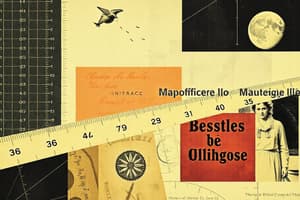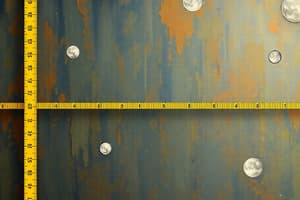Podcast
Questions and Answers
What was the mistake made by NASA in the Mars Climate Orbiter mission?
What was the mistake made by NASA in the Mars Climate Orbiter mission?
- Using kilograms instead of pounds
- Using meters instead of feet
- Using pounds instead of Newtons (correct)
- Using Celsius instead of Fahrenheit
What is essential to ensure when using a ruler to measure length?
What is essential to ensure when using a ruler to measure length?
- The wire must be straight and start from the zero point (correct)
- The ruler must be electronic
- The ruler must be made of metal
- The ruler must be flexible
What is the SI unit for length?
What is the SI unit for length?
- Kilometer (km)
- Meter (m) (correct)
- Millimeter (mm)
- Centimeter (cm)
What is the formula to calculate the volume of a cube?
What is the formula to calculate the volume of a cube?
What method is used to measure the volume of an irregular shape?
What method is used to measure the volume of an irregular shape?
What is the advantage of using a digital clock over an analog clock?
What is the advantage of using a digital clock over an analog clock?
What is the formula to calculate density?
What is the formula to calculate density?
What is the SI unit for density?
What is the SI unit for density?
Why is measurement important in scientific experiments?
Why is measurement important in scientific experiments?
What is the purpose of calibrating a ruler?
What is the purpose of calibrating a ruler?
Which of the following is an example of measuring length in an experiment?
Which of the following is an example of measuring length in an experiment?
What is the advantage of using SI units in measurement?
What is the advantage of using SI units in measurement?
What is the formula used to calculate the volume of a sphere?
What is the formula used to calculate the volume of a sphere?
What is the traditional method of measuring time?
What is the traditional method of measuring time?
What is the unit of measurement for density?
What is the unit of measurement for density?
What is the purpose of measuring density in scientific experiments?
What is the purpose of measuring density in scientific experiments?
Flashcards are hidden until you start studying
Study Notes
Making Measurements
- Measurement is important because a small mistake can lead to a huge failure, like NASA's Mars Climate Orbiter mission, which failed due to using pounds instead of Newtons.
Measuring Length
- We use rulers to measure length, and it's essential to use them correctly:
- The wire must be straight and start from the zero point.
- The ruler must be calibrated, meaning it measures exactly 1 cm from 0 to 1.
- Examples of measuring length:
- Measuring the length of a wire in an electricity experiment.
- Measuring the thickness of a paper by stacking 500 papers and dividing the total thickness by 500.
- Measuring the length of a thread by laying it on a line and using a ruler.
SI Units
- SI units are standardized units used globally to ensure consistency in measurements.
- The SI unit for length is meter (m).
- We can use prefixes like centi-, deci-, milli-, kilo- to change the unit.
Measuring Volume
- We use different formulas to calculate the volume of regular shapes:
- Cubic: length × width × height
- Sphere: (4/3) × π × r³
- Cylinder: π × r² × h
- For irregular shapes, we use the water displacement method:
- Measure the initial volume of water in a measuring cylinder.
- Add the object, and measure the final volume.
- Calculate the volume of the object by subtracting the initial volume from the final volume.
- Measuring cylinders are used in water displacement method.
Measuring Time
- We use clocks to measure time, either analog or digital.
- Digital clocks are more accurate and can measure time in milliseconds and nanoseconds.
- The traditional way of measuring time is using a pendulum:
- The pendulum oscillates at a constant rate.
- We can calculate the time taken for one oscillation by using a stopwatch.
Measuring Density
- Density is the amount of matter concentrated in a small volume.
- The formula to calculate density is mass divided by volume.
- The SI unit for density is kg/m³.
- Density determines whether an object sinks or floats in water:
- If the object is denser than water, it sinks.
- If the object is less dense than water, it floats.
Problem-Solving Strategies
- Underline key terms in the question.
- Use the correct formula and units.
- Break down complex problems into smaller steps.
Making Measurements
- Measurement accuracy is crucial, as small mistakes can lead to significant failures, like NASA's Mars Climate Orbiter mission.
Measuring Length
- Rulers are used to measure length, and correct usage is essential:
- The wire must be straight and start from the zero point.
- The ruler must be calibrated to ensure accurate measurements.
- Examples of measuring length include:
- Measuring wire length in electricity experiments.
- Measuring paper thickness by stacking and dividing.
- Measuring thread length by laying it on a line and using a ruler.
SI Units
- SI units are globally standardized to ensure consistency in measurements.
- The SI unit for length is the meter (m).
- Prefixes like centi-, deci-, milli-, and kilo- can be used to change units.
Measuring Volume
- Formulas are used to calculate volumes of regular shapes:
- Cubic: length × width × height.
- Sphere: (4/3) × π × r³.
- Cylinder: π × r² × h.
- The water displacement method is used for irregular shapes:
- Measure initial water volume.
- Add the object and measure final volume.
- Calculate object volume by subtracting initial from final volume.
Measuring Time
- Clocks, both analog and digital, are used to measure time.
- Digital clocks are more accurate and can measure in milliseconds and nanoseconds.
- The traditional way of measuring time uses a pendulum:
- Pendulum oscillates at a constant rate.
- Calculate time taken for one oscillation using a stopwatch.
Measuring Density
- Density is the amount of matter concentrated in a small volume.
- The formula to calculate density is mass divided by volume.
- The SI unit for density is kg/m³.
- Density determines whether an object sinks or floats in water:
- Objects denser than water sink.
- Objects less dense than water float.
Problem-Solving Strategies
- Underline key terms in the question.
- Use correct formulas and units.
- Break down complex problems into smaller steps.
Making Measurements
- Measurement accuracy is crucial, as small mistakes can lead to significant failures, like NASA's Mars Climate Orbiter mission.
Measuring Length
- Rulers are used to measure length, and correct usage is essential:
- The wire must be straight and start from the zero point.
- The ruler must be calibrated to ensure accurate measurements.
- Examples of measuring length include:
- Measuring wire length in electricity experiments.
- Measuring paper thickness by stacking and dividing.
- Measuring thread length by laying it on a line and using a ruler.
SI Units
- SI units are globally standardized to ensure consistency in measurements.
- The SI unit for length is the meter (m).
- Prefixes like centi-, deci-, milli-, and kilo- can be used to change units.
Measuring Volume
- Formulas are used to calculate volumes of regular shapes:
- Cubic: length × width × height.
- Sphere: (4/3) × π × r³.
- Cylinder: π × r² × h.
- The water displacement method is used for irregular shapes:
- Measure initial water volume.
- Add the object and measure final volume.
- Calculate object volume by subtracting initial from final volume.
Measuring Time
- Clocks, both analog and digital, are used to measure time.
- Digital clocks are more accurate and can measure in milliseconds and nanoseconds.
- The traditional way of measuring time uses a pendulum:
- Pendulum oscillates at a constant rate.
- Calculate time taken for one oscillation using a stopwatch.
Measuring Density
- Density is the amount of matter concentrated in a small volume.
- The formula to calculate density is mass divided by volume.
- The SI unit for density is kg/m³.
- Density determines whether an object sinks or floats in water:
- Objects denser than water sink.
- Objects less dense than water float.
Problem-Solving Strategies
- Underline key terms in the question.
- Use correct formulas and units.
- Break down complex problems into smaller steps.
Studying That Suits You
Use AI to generate personalized quizzes and flashcards to suit your learning preferences.




